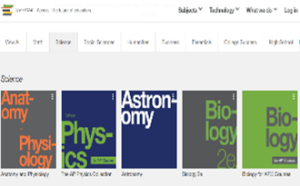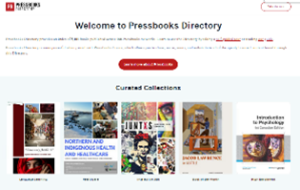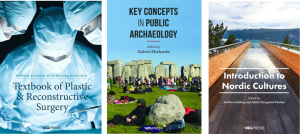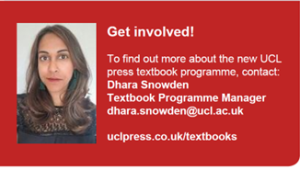What are Open Access textbooks?
Open Access (OA) textbooks are open educational resources or instructional resources created and shared or published in ways that allow more people to access them. OA textbooks offer physical books available at a very low cost and digital versions available for free, with licence terms allowing the opportunity to reuse and repurpose materials in new ways, e.g., enhancing diagrams, adding new material based on local case studies, removing/updating irrelevant or outdated material, etc. This ability to repurpose books leads to innovative and engaging pedagogies, including involving students as co-authors.
UCL, through UCL Press, is investing in an OA textbook programme (see below), publishing for courses run at UCL and in other universities, as well as maximising wider opportunities of using and repurposing a range of OA educational resources. In doing so, it is challenging the status quo in which universities are vulnerable to expensive digitally licensed textbooks from commercial publishers.
How can I reuse or modify OA resources?
- Identify and understand CC licences
- Add third-party content and permissions
- Include attributions
More information on these options is available on UCL’s Open Education website.
Benefits of OA textbooks
Studies in the UK[1] have found considerable interest and appetite for open textbooks amongst UK academics, driven mostly by the freedom to adapt and develop textbooks, potentially within co-creation models, to save money for students and university libraries, and to cater for niche courses that commercial textbook publishers ignore. Studies also found that a range of isolated practices of OA textbook use were in existence, dispersed across the UK. The primary motivations for using OA textbooks were:
- The immediacy and ease of access to free digital resources.
- To offer enduring access to students who will be able to access resources even after they have completed their course, promoting lifelong learning.
- The ability to experiment and adapt such resources.
- The opportunity to innovate on pedagogic models with openly licensed content, showcasing innovative approaches to teaching and learning.
- Reducing the considerable cost burden for students and university libraries buying proprietary textbooks.
- Addressing concerns about external forces with a solution to “the increasingly heavy-handed, restrictive and costly publishing industry” practices.
- Strengthening professional reputation, by raising the profile and increasing impact of an academic’s work to a wider audience.
- And more specifically for UCL, sustaining its civic and founding commitment to be open and accessible to all.
Examples of extensive and/or creative use of OA textbooks and resources, and authoring these OA resources, can be demonstrated, and rewarded in promotion applications and HEA Fellowship applications. The UCL Academic Careers Framework states that all research outputs should be available via Open Access wherever possible. For the Education (or ‘teaching’) criteria, it also states that ‘Adoption of Open Access dissemination processes and routes’ is an indicator of impact. Full details are given in the Framework.
The rising cost of textbooks, combined with issues of availability, particularly digitally, are a challenge for universities and a potential barrier to student learning. Open access publishing provides a means to make textbooks accessible to a wider audience, while also reducing the burden on library budgets, and UCL Press, the UK’s first fully open access university press, is responding to this issue through its new open access Textbook Programme.
Finding and using OA textbooks
It can be time-consuming to find appropriate OA replacements for textbooks and to evaluate them. UCL Subject Liaison Librarians can work with academics on this, and point towards the large number of dissemination platforms where open education resources are indexed and hosted.
Here are the top 5 places to look for OA Textbooks:
| OpenStax – adopted at over 30 universities in the UK and Ireland and used at 60% of US colleges |  |
| Open Textbook Library – over 1,000 open textbooks |  |
| Pressbooks Directory – c. 1,000 open textbooks |  |
| Directory of Open Access Books |  |
| OER Commons |  |
A full list of where to find OA Textbooks and OER is given on UCL’s Open Education website.
Experience of writing and using OA textbooks
There are several examples of UCL academics creating or contributing to bespoke OA teaching and learning resources, for example, Programming Historian and CORE Econ, which have been very effective in reaching specific audiences globally.
There are also existing OA textbooks available from UCL Press including the highly successful Textbook of Plastic and Reconstructive Surgery, Key Concepts in Public Archaeology, and Introduction to Nordic Cultures.

Since publication, these texts combined have received more than 200,000 downloads, in 195 countries and territories.
We interviewed Professor Jakob Stougaard-Nielsen, Professor of Scandinavian and Comparative Literature, and Vice-Dean (Education) and Director for UCL’s Centre for Humanities Education, and Luka Crnjakovic, CORE Econ Head of Operations, Department of Economics, and asked them to talk about their experience of authoring an OA textbook and using such a text in teaching and the benefits it can bring. Videos clips of these interviews are given here:
Some quotes from the full interviews that we would highlight are:
Professor Stougaard-Nielsen
Why write an OA textbook?
“We felt that what we were doing needed to have a much wider reach than simply internally at UCL and we had hoped that the producing something Open Access would allow our book and our thoughts to travel much further afield to other countries. It has really enabled us to enter into conversation about the Nordic with a vast range of readers across the globe.”
“[A] particular emphasis of this textbook was to avoid the sort of canonical book…the great advantage with an Open Access publication is it can be more dynamic.”
Creating an identity for the Department
“[The book] is a kind of a calling card …[It] has really helped to forge or consolidate an identity both for the Department, but also for the fields as a whole, and to really put both of those things out there. It has helped us starting a conversation about the kind of skills, the kind of critical thinking and the kind of views of the Nordic that we give to our students. And that helps us thinking about new courses that we make for our students in the future for core courses, the kind of program structure we have.”
Research-led teaching
“So what an Open Access textbook has been able to offer the rest of the world is a very specific take on a discipline that encapsulates a lot of the teaching culture that’s developed in the department over quite a number of years. So yes, it’s scholarship, but it’s also way of looking at the field that’s developed through teaching, through teaching across a number of subfields. A well-functioning textbook that communicated very well to its audience.”
Promotion track
“I do think that producing textbooks or something similar is something that is recognized at UCL as a major contribution to national or international education. I certainly have for my own promotions included this textbook…[the] writing of it and editing of it as part of our contribution to education.”
Luka Crnjakovic
Why write an OA textbook?
“It’s easier to update the textbook with new data and new research and context and so on. We can be very much faster in incorporating the latest research into the textbooks. It’s much easier to work collaboratively and to make all those changes that we make over the years to continue being very current in an OA environment as opposed to being restricted by the traditional publishing model.”
Reaching a global audience
“So, another…benefit from publishing our textbooks is the wide audience that they can reach. So, for instance, we have people who are doing very cutting-edge research on environmental economics, on competition and so on, that will rarely get outputted outside of let’s say an academic journal. So, what we provide is a very large audience…130,000 people per year across the world.”
Textbooks from UCL Press – a brand-new open access textbook programme
UCL Press is currently developing a new programme of open access textbooks, for undergraduate and postgraduate courses and modules, across a variety of disciplines.
The Programme’s Mission is to deliver research-based content to UCL students and national/international audiences, supporting learning and enhancing the reputation of its authors, and offering leadership in the form and quality of its educational offering.
Each textbook will be developed with the student in mind and include pedagogical features to support navigation through a key topic or theme, within a given subject area. We appreciate the efforts required for academics to write textbooks and UCL Press are offering authors a writing fee for their work.
Our initial programme of open access textbooks will be written by academics and experts based at UCL and provide faculty, students, and the wider academic community with digitally accessible, peer-reviewed, textbooks that showcase teaching excellence and support the learning experience.
The Programme’s Strategy also includes advocacy for and modification of existing OA textbooks and other open educational resources, as well as further development of UCL’s Open Education Resources Repository: OpenEd@UCL.
Forthcoming OA textbooks
There are several new textbooks under contract, across a range of disciplines, with many other proposals being reviewed, and expressions of interest in writing an OA textbook under discussion.
The first four of these textbooks are on track to publish in Autumn 2023 and Spring 2024.
Call to Action
Writing for the UCL Press OA Textbook Programme
 If you can’t find a suitable OA alternative for your reading list, would you consider writing a new OA textbook for your course or module?
If you can’t find a suitable OA alternative for your reading list, would you consider writing a new OA textbook for your course or module?
If you are based at UCL and feel that there is an opportunity to collaborate with UCL Press on an OA textbook, then we would love to hear from you. Contact: Dhara Snowden, Textbook Programme Manager dhara.snowden@ucl.ac.uk
Advocacy for OA textbooks and other open educational resources
If you have colleagues who may be interested in using OA textbooks and resources in their teaching, or in writing an OA textbook, then please share this flyer with them: OA Textbook Advocacy Flyer.
[1] http://ukopentextbooks.org/uk-open-textbooks/uk-open-textbooks-report/